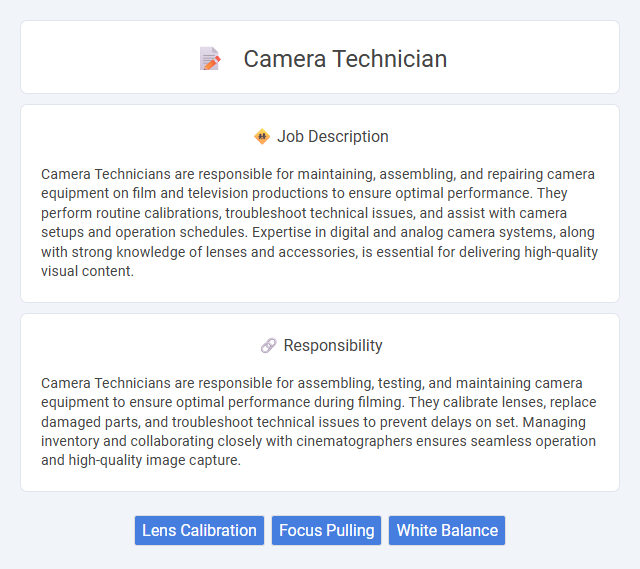
Camera Technicians are responsible for maintaining, assembling, and repairing camera equipment on film and television productions to ensure optimal performance. They perform routine calibrations, troubleshoot technical issues, and assist with camera setups and operation schedules. Expertise in digital and analog camera systems, along with strong knowledge of lenses and accessories, is essential for delivering high-quality visual content.
Individuals with strong technical skills and a keen eye for detail are likely to thrive as camera technicians, as the role demands precision and a deep understanding of camera equipment. Those who may struggle with long hours on set or high-pressure environments could find this job challenging. A passion for film and technology increases the probability of job satisfaction and success in this career.
Qualification
A Camera Technician must possess in-depth knowledge of camera equipment maintenance, repair, and calibration to ensure optimal performance on set. Proficiency in handling digital and film cameras, understanding of lens mechanics, and expertise in troubleshooting technical issues are essential qualifications. Experience with various camera brands and familiarity with industry-standard software and tools further enhance job effectiveness.
Responsibility
Camera Technicians are responsible for assembling, testing, and maintaining camera equipment to ensure optimal performance during filming. They calibrate lenses, replace damaged parts, and troubleshoot technical issues to prevent delays on set. Managing inventory and collaborating closely with cinematographers ensures seamless operation and high-quality image capture.
Benefit
Camera technicians likely experience increased job satisfaction due to hands-on engagement with advanced filming technology and creative environments. This role may offer competitive salaries and opportunities for career growth within the film and television industry. Workers might also benefit from working on diverse projects, which can enhance skills and professional networks.
Challenge
A Camera Technician role likely involves constant problem-solving due to the complexity and high precision required in maintaining and repairing camera equipment. Challenges may arise from unpredictable technical failures on set, demanding quick troubleshooting and adaptability to prevent delays. The position probably requires staying current with evolving camera technologies to effectively support various filming conditions.
Career Advancement
A Camera Technician plays a crucial role in the film and television industry by maintaining, repairing, and calibrating camera equipment to ensure optimal performance on set. Career advancement opportunities include progressing to senior technician positions, specializing in digital imaging technology, or transitioning into roles such as camera operator or director of photography. Continuous skill development and certifications in new camera technologies significantly enhance prospects for promotion and higher earnings.
Key Terms
Lens Calibration
Lens calibration plays a crucial role in the responsibilities of a Camera Technician, ensuring optimal image quality and precise focus during filming. This process involves adjusting the lens elements to achieve accurate sharpness and color consistency across various cameras and shooting conditions. Proficiency in using calibration tools and software is essential for maintaining the technical standards required on professional film sets.
Focus Pulling
Focus pulling is a critical skill for camera technicians responsible for maintaining sharp image focus throughout filming. Mastery of focus pulling requires precise control of lens rings and real-time adjustments based on actor movement and camera positioning. Expertise in focus pulling enhances visual storytelling by ensuring clarity and depth in every shot.
White Balance
Camera technicians play a critical role in ensuring accurate white balance to achieve true-to-life color representation in video production. Precise calibration of white balance settings prevents color casts caused by varying lighting conditions, enhancing image quality and consistency across scenes. Mastery of white balance adjustment tools and real-time monitoring is essential for effective color correction and maintaining visual integrity on set.
 kuljobs.com
kuljobs.com